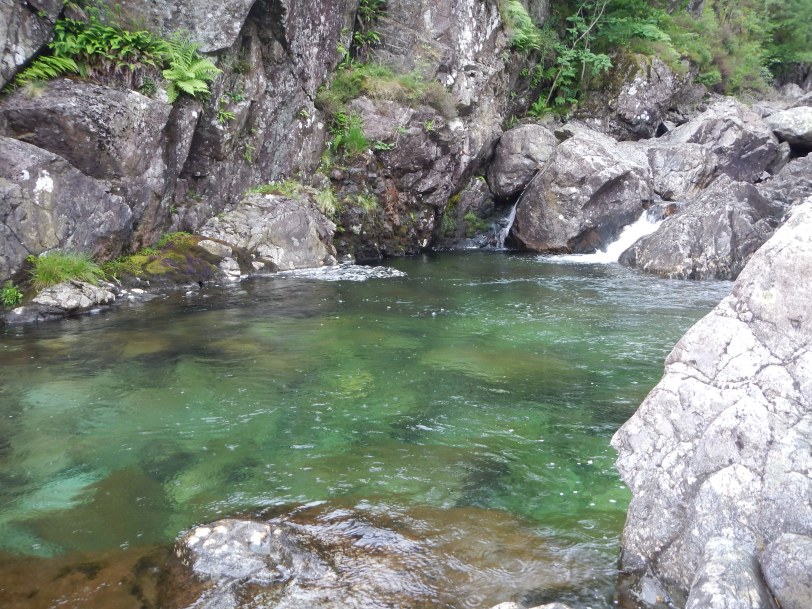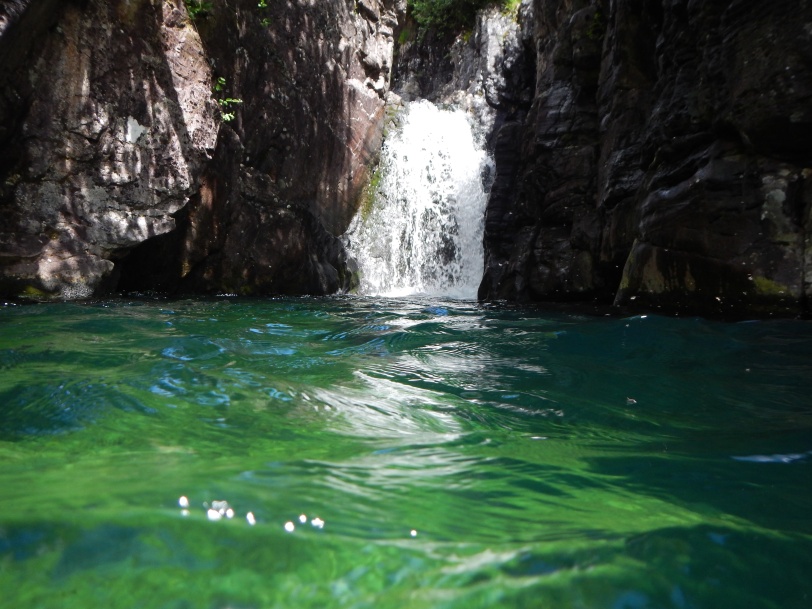The Lake District National Park contains more climbable peaks than anywhere in England, but if you’re lazy like me and would prefer to simply drive up one, then the precipitous Hardknott Pass in West Cumbria is right at the top of your street.
Unlike the reckless off-roader who bagged Snowdon in 2011, my own alpine journey to the remote valley of Eskdale was perfectly legal, yet still felt like a trek into the unknown. The OS map revealed little except two voluminous becks tumbling from the shoulders of Scafell Pike, hinting at an auspicious array of pools and falls to entice the watery traveller.
Leaving the car in a lay-by above Hardknott Gill, I walked down to Brotherilkeld Farm, picking up a level footpath beside the rocky River Esk. Streams shone from the hills, becks spouting everywhere as if the mountain massif were forcing the water table up through every crack and fissure. Three hikers followed at a distance, striding purposefully beneath spectating crags towards the verdant foothills of England’s highest peak. The Pike itself was just tall enough to catch the passing clouds, its scree-drizzled summit invisible for most of the day.
After two miles I found Tongue Pot; a deep enclosed pool or ‘dub’ proportionate in shape to a large human tongue, and the colour of lime juice where the water reflects the overhanging rowan tree. Fish hung silently in its limpid depths, their refracted images wavering with the current as if shaped by a squiggly kitchen knife. Here the gradient steepens, and an apparently mortarless packhorse bridge crosses the stream where the two becks meet. Encouraged by neither man nor dog, a solemn procession of black, brown and grey sheep – like All Saints’ knitwear rail – traversed the arch in single file, perhaps on an ovine pilgrimage to lesser-nibbled pastures at the foot of the vale.
The three hikers, meanwhile, had completely vanished.
While I waited for a gap in the woolly traffic, the mysterious men re-emerged from behind a dry-stone wall, only now as aquatic adventurers; suited up in technicolour wetsuits, lifejackets and helmets, like extreme kayakers who’d forgotten their boats. One by one they slipped into the river, scrambling through the gullies, pummelled by boiling cold white water. Their yells resounded as I traced the thundering beck uphill to Esk Falls, whose incessant drops are too vertiginous even for the ghyll scramblers. Slithering down the escarpment, feeling the mottled rocks rough under my palms like dinosaur skin, I discovered a pastel-green pool, its lustrous sheen dibbled by dripping rain. While the Dales’ rivers are stained orange by peat sediment, the becks and lakes of Cumbria are coloured by the stones lining their bed; in greens, greys, blues and browns.
Watching an abseiler teetering down a cliff face, I trudged upwards to Great Moss, where the landscape flattens out and the Esk meanders through the miry plain like a lowland stream. The Tibetan vista tempted me onwards, but with only hours to explore I returned south through chest-high bracken to Throstlehow Crag and the Aegean waters of Lingcove Falls.
Concealed in a gloomy cavity between walls of rock was an opportune pool, glowing green as a Turkish bath where the noon sun could filter through the covering trees. Bathing my blistered feet, I rested on the hot silver rocks, tuning my ears to the wild audio signature of water, wind and birds; revelling in the upland solitude. Before the sun began to disappear – as it often does in the Lakes – I followed the sheep track back to the farm and the foot of the pass, feeling the labour of the gears as I drove the serpentine road home across the mountains to Yorkshire.





